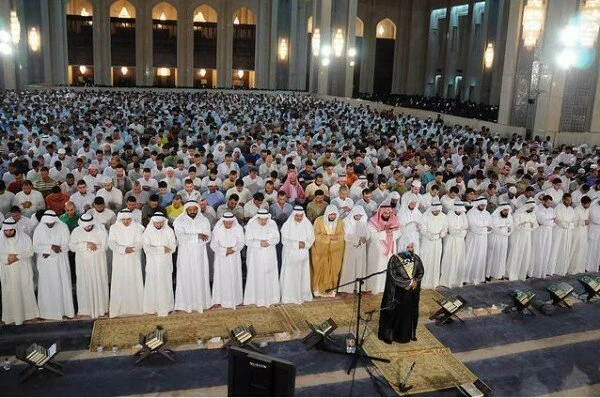Amongst the special Ibaadah of the month of Ramadan are the fasts and the Taraweeh. Taraweeh is the special evening prayers are conducted during which long portions of the Qur’an are recited.
Taraweeh prayers are prayed in pairs of two and can be prayed 20 rakat. Some believe that 8 can be read. A break is taken after every 4 rakah.
It is customary to attempt a khatm “complete recitation” of the Quran as one of the religious observances of Ramadan by reciting at least one juz’ per night in Taraweeh . Taraweeh prayers are considered optional, not mandatory.
Once, in the holy month of Ramadan, the Prophet (PBUH) came out of his home and led Salat Al-Taraweeh. The Sahabah (R A) who were present at the time, prayed behind him in congregation. The second and the third nights, a larger number of Sahabah (R A) came and performed Salat Al-Taraweeh behind the Prophet (PBUH). On the fourth night, an even larger number of Sahabah (R A) showed up in the Masjid expecting to pray this new salat behind the Prophet (PBUH). But, he did not come out to lead Salat Al-Taraweeh that night. The Sahabah (R A) waited all night. When the Prophet (PBUH) finally emerged for the Fajr prayer he told them:
“I knew you were waiting for me, but I did not come out to lead Salat Al-Taraweeh last night because I was afraid it might become an obligation (Fard) on the Ummah which they might find difficult to fulfill.”
The great muhaddith, Hafiz Ibn Hajar (Rahmatullah ‘Alay), who is well-known for his interpretation of Sahih Al-Bukhari has reported in his book Al-Talkhees Al-Habeer on the authority of ‘Aisha (Radhiallahu anhaa) that the Prophet (PBUH) performed twenty raka’at Taraweeh on those three nights (Al-Talkhees Al-Habeer, h540).
Imam Ibn Habban (Rahmatullah ‘Alay), on the other hand, has reported a hadith in which it is asserted that the Prophet (PBUH) performed eight raka’at of Taraweeh on those three nights. However, this hadith is extremely weak because one of the people in the chain of narrators is a person named Isa Ibn Jaariyah. Imam Nasa`i (Rahmatullah ‘Alay)
and Imam Abu Dawood (Rahmatullah ‘Alay) have strongly questioned the authenticity of this narrator. Consequently, both of these Imams of hadith concluded that ahadith narrated by Isa Ibn Jaariyah must never be accepted.
However, even if the hadith narrated by Isa Ibn Jaariyah was not weak, it would still not be adopted because it goes against a clearly established practice and consensus of Sahabah (R A). As a rule of Islamic jurisprudence, any hadith that goes against the clearly established practices and consensus of Sahabah (R A) will not be adopted for practice.

